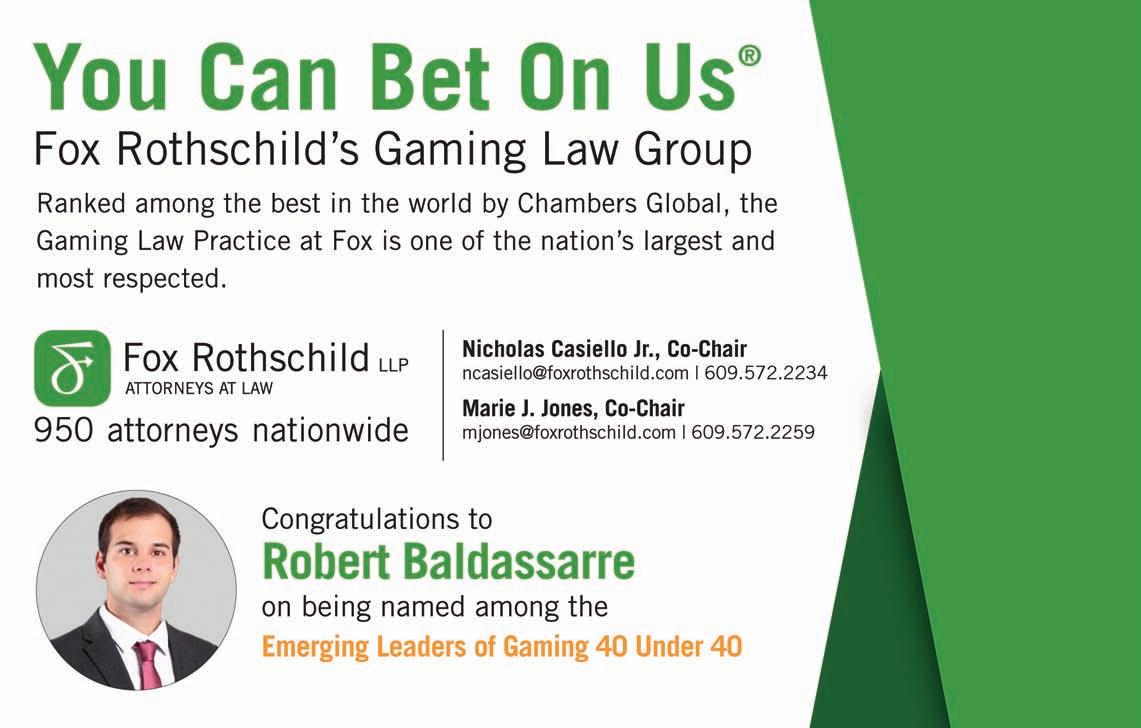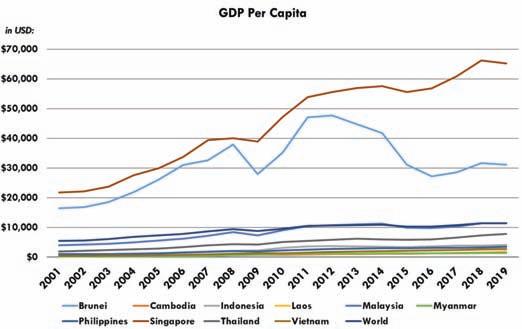
48 minute read
Sports Action
Big Bets

Advertisement
By Marjorie Preston



As more U.S. states launch legal sports betting, operators and suppliers are flooding the field in search of some action
For decades, U.S. lawmakers and sports leagues resisted legal sports betting for fear it would be a corrupting influence on leagues and players. Blocking the action was New Jersey Senator and former NBA star Bill Bradley, who claimed legal bets political parties and even retail gaming operators. Sports leagues, while condemning the industry for decades, didn’t understand the benefits that working with the betting industry could bring.” The light began to dawn in 2014, when NBA Commissioner Adam Silwould turn each athlete into “a roulette chip.” ver wrote an op-ed in The New York Times calling for sports betting to be
Bradley’s 1992 Professional and Amateur Sports Protection Act “brought out of the underground and into the sunlight, where it can be (PASPA) made the activity a nonstarter for state legislatures, but the wagers monitored and regulated.” kept rolling thanks to neighborhood bookies and offshore black marketers. “This article got the conversation started,” says McDowell, “and it was In 1999, the National Gambling Impact Study Commission estimated that pure economics that took over from there.” illegal betting generated $80 billion to $380 billion a year. Among the first providers in New Jersey was iGaming supplier GAN,
In May 2018, the U.S. Supreme Court nullified PASPA, opening the which originated in Europe but had been scoping the landscape since 2013, door to legal sportsbooks on a state-by-state basis. And the big game was when state lawmakers OK’d online casinos. on. In the first full year of New Jersey’s legal market, bettors placed more “The Supreme Court decision … had been building for a while, and than $2.9 billion in wagers, of which $22.6 million went to the state. Since equally importantly, there was a groundswell of alignment and a pretty big then, the industry has skyrocketed, in spite of the pandemic, which shut shift in the mindset from the leagues, the general population and all the down major sports and reduced U.S. fans to betting on darts and table ten- stakeholders within the industry,” says GAN Chief Commercial Officer Jeff nis. In August, with pro sports back in full swing, Garden State gamblers set Berman. “We saw it coming, and as a company made the very conscious dea record for the most money bet on sports in a single month—$668 mil- cision to focus exclusively on the United States in anticipation of legal sports lion, up 56.7 percent over August 2019. and casino betting.”
“New Jersey was the first domino,” says Brian Wyman, senior vice pres- Today, 20 U.S. states offer legal sports betting, and eight more have legident of operations and data analytics for The Innovation Group. “And islation that would introduce the activity. given the results there, I’m not surprised that we’re in the place that we are now.” Keeping Score ‘Pure Economics’ In New Jersey alone, more than two dozen mobile and retail sportsbook operators have staked a claim, with European sportsbooks and suppliers AmerSo, what happened to change the perception of sports betting in the U.S.? icanizing their models to serve the exploding U.S. market. Plenty of upstarts
Dave McDowell, CEO of FSB Technology, a London-based gaming are challenging the bricks-and-mortar casinos and market leaders like Fansoftware company, says it came down to “education across sports leagues, Duel and DraftKings. “I see DraftKings commercials in Nevada, where DraftKings doesn’t even operate yet,” says Berman. “New Jersey was the first domino. “Their marketing spend is astronomical, and we’re And given the results there, I’m not seeing that reflected in their top line. Over time, as it focuses more on profitability, its competitors will besurprised that we’re in the place come better capitalized, form better media partnerthat we are now.” ships and be able to better compete in the advertising space.” —Brian Wyman, Senior Vice President of Operations and Nowadays, it’s hard to keep track of the overlapData Analytics, The Innovation Group ping partnerships among leagues, media outlets and sportsbooks: DraftKings’ dance card includes the New York Giants, the Denver Broncos, the PGA
In the first full year of New Jersey’s legal market, bettors placed more than $2.9 billion in wagers, of which $22.6 million went to the state. Since then, the industry has skyrocketed, in spite of the pandemic, which shut down major sports and reduced U.S. fans to betting on darts “U.S. states that have already passed regulation could now beand table tennis. looking to advance discussions
—Max Meltzer, Chief Commercial Officer, Kambi
Tour, Major League Baseball, the NFL, ESPN and Wrigley Field. BetMGM is allied with the Broncos, the Detroit Lions and NASCAR, among others. Australian comer PointsBet has compiled an impressive list, joining with NBC Sports, the PGA, the NBA, the Denver Nuggets, the Colorado Avalanche, the Indiana Pacers, the Detroit Tigers… and the list goes on.
The pending acquisition of William Hill by casino giant Caesars Entertainment suggests a trend of mergers and acquisitions that will make the big fish even bigger (Caesars owns or manages 54 casinos in 16 states, and William Hill owns sportsbooks in 10 states plus the District of Columbia).
“The companies that control the brick-and-mortar assets have balance sheets that allow them to accumulate and grow vertically and horizontally— really, they have the ability to shape their future,” says Michael Soll, president and founding member of The Innovation Group. “I expect to see more absorption and more control by a smaller number of larger companies in the long run, but there will always be a diversity of other companies in the fray who aren’t so tied to bricks-and-mortar who will keep it interesting and competitive.
“In a pure gaming revenue sense, sportsbooks don’t provide a mindbending contribution,” Soll points out, “but it’s going to be well-received, it’s going to be a lasting part of the industry, and the numbers will be meaningful.”
In January, Penn National Gaming bought a piece of sports media player Barstool Sports, a transaction Wyman calls “a play on customer acquisition. With these kinds of mergers, a lot of times it’s about looking at databases and understanding whether you can cross-monetize them to make the transaction price attractive.”
While that matchup may have been a head-scratcher to some—buttoned-down Penn allying itself with wild and woolly Barstool—there’s no question the latter has a fiercely loyal audience of young, engaged sports fans. Rather than investing heavily in customer acquisition, Penn “found a creative way to compete that didn’t turn this into an arms race in the media space,” says Wyman. “That’s what we’re seeing with the Penn-Barstool deal, and what we’ll see with other partnerships down the road.”
The User Experience
So, what are bettors looking for in a sportsbook?
Richard Schwartz, president of Rush Street Interactive, owner of the BetRivers and PlaySugarhouse brands, says reliability and simplicity are essential, plus a user interface that’s “clean and easy to follow.
“They want a wide range of content. They want in-game and prematch content and live streaming so they can bet while they watch, along with strong loyalty programs, prompt payouts and good customer service. Early cash-out is a valuable feature for players who have an edge and want to guarantee a win. The live-odds offering appeals to a wide audience, because it creates an extra dimension and excitement while watching games.”
He says RSI emphasizes the basics: “things like being trustworthy, offering a great user experience, being efficient with players’ time when they reach out to our customer service team, and removing friction from the user experience wherever we can. We create loyalty by doing the little things right and making a difference to players.”
The company’s key to success is “having a foundationally strong business, and not simply chasing what others do in the industry. Our focus has been on doing the things that matter most: increasing our conversion and retention rates. We do that by marketing smartly and efficiently to acquire the right players, and once we acquire them, doing everything we can to differentiate the user experience and provide a high-quality service.”
Max Meltzer, chief commercial officer for U.K.-based sports betting provider Kambi, now expanding into the U.S., says a high-performance sportsbook “requires a supply chain capable of delivering on all levels, beginning with the integration of official data partners and proven algorithms that process the data, followed by excellence in trading and risk, which must all be supplied through a fast and intuitive front end.”
Beyond that, he adds, “Giving bettors the opportunity to drive their own experience is a trend sports betting must continue to embrace. The technology exponentially increases the size of the menu, offering odds on demand and lifting the limitations on player freedom to a far greater extent than the traditional bet-builder.”
Movies vs. Netflix
For obvious reasons, the emphasis this year has been on mobile sports betting, but Schwartz says retail can and will endure if operators “create experiences that are unique to the land-based physical experience, and give players something they can’t replicate at home.
“If you look at the movie industry, there’s still ample interest in going to theaters. It’s going to cost you more, but you get a bigger-than-life experience, and that’s what casinos can create in a sportsbook. There’s nothing more exciting than the thrill of a big game, experiencing that massive enthusiasm among other bettors, with everybody cheering together at the outcome.
—Richard Schwartz, President, Rush Street Interactive
“But there’s also the Netflix equivalent, with convenience and a lower price versus the bigger-than-life experience out on the town. I think there’s room for both. Rush Street has a heritage in land-based, so we focus on ways to converge online and land-based casinos, motivating a player online to visit the land-based casino more often.”
Wyman agrees that retail sportsbooks provide a communal experience that players can’t get from their man caves and La-Z-Boys. “If you’ve ever been in a sportsbook during a game-changing touchdown or home run, the whole place erupts.” He points out that even before the pandemic, “80 percent of bets in New Jersey were on the mobile platform. Mobile was always the winner here, but retail sportsbooks won’t go away, even if the way we use them changes.”
Will fallout from Covid-19 get more states in the game and push mobile permanently to the fore?
“We’ve already seen Michigan look to expedite its online sports betting regulation, and wouldn’t be surprised to see others follow suit,” says Meltzer. “I also think that U.S. states that have already passed regulation could now be looking to advance discussions regarding iCasino, creating a full ecosystem for iGaming.”
Covid-19 may cause holdout states to reconsider, especially when it comes to mobile and online betting, agrees Berman.
“It’s no secret that states’ revenues from casino tax revenues have dried up. They’re looking at alternative revenue sources online. We think the vast majority of states will have sports betting and online casino within five years.”
Out of the Shadows
Will legal U.S. sportsbooks ever put their biggest competitors—offshore, unregulated operators—out of business?
“Over time, it will be more difficult for these black-market sites,” says Schwartz. “The illegal sites may initially be attractive because they can offer credit and better pricing, since they’re not paying taxes, gaming fees and leagues. But they’re certainly not as reliable and trustworthy as legal, regulated operations. They can’t offer the same variety of content in most cases. And when players win, it takes a long time to be paid.”
In a telling move, in September Costa Rican sportsbook 5Dimes reached a $46.8 million settlement with the U.S. Department of Justice, part of a rumored bid to re-enter the market as a legal operator. The firm has already incorporated a U.S. arm, 5D Americas LLC in Delaware.
When a onetime illegal operator is willing to pay to go straight—with no guarantees the gambit will work—that says something about the value of the legal market.
Do the Right Things

Dave McDowell CEO, FSB Technology
GGB: You said last fall that the U.S. will have one of the largest regulated sports betting markets in the next five years. Is that still true? Dave McDowell: Without a doubt, the U.S. will become one of the largest regulated sports betting markets, provided that sports betting is rolled out responsibly and intelligently.
Ignoring social responsibility and causing harm to consumers is the single biggest threat to continued expansion, and can reverse the gains we’ve made to date. Over-taxation, which includes monopoly pricing on official league data, is the single biggest threat to consumer adoption and will keep the underground markets thriving. But if we move forward responsibly, both consumers and operators will come out as winners.
Regulated sports betting and online gaming in general is long overdue. It’s a pretty simple argument—the black market offers no player protections, there are no jobs created and there’s no tax revenue. I think everyone finally agrees that prohibition and turning a blind eye to it doesn’t work.
Do you see sports betting becoming truly global as a result of technology, or will it remain a hometown, “home team” thing? The sports betting industry is already global; the real question is if U.S. consumers will ever take a serious interest in anything other than domestic competitions. That isn’t something I’d bet on in the short term.
But consider soccer, the most popular betting sport. Live data feeds are collected from hundreds of countries and distributed to the industry in near-real time. Hundreds of billions of dollars are wagered in the Asian, European, African, Latin American and Middle Eastern markets, where the largest global operators are closely monitored for price movements that can shift odds across the globe.
Companies like FSB use all this data as inputs into our own real-time odds models to create hundreds of betting markets on a single game, then distribute data into sports betting platforms to take wagers across the globe.
In just a few seconds, a goal scored in one country affects data that’s transmitted to almost every other country on the planet. The same happens for every NBA game. The league has a massive following in China and across many European countries.
The Best Is Yet To Come

Emerging Leaders of Gaming 40 Under 40 for 2021 is an extraordinary class


By Patrick Roberts
The newest members of the gaming industry are consistently hardworking, innovative, and globally aware. They understand that to progress the industry, and their own careers, extra thought and time are required. And, with that effort, they are often recognized as elite members of the Emerging Leaders of Gaming 40 Under 40. When The Innovation Group, organizers of the Emerging Leaders of Gaming program, and Global Gaming Business Magazine (GGB) announced the winners of the class of 2021 Emerging Leaders of Gaming 40 Under 40, a program that recognizes young professionals making significant impacts in the casino gaming industry, it was clear that the selections were the cream of the crop.
The winners were part of 150-plus industry members who were nominated by colleagues who recognized their commitment and dedication to the gaming industry.
“During such a difficult time, it’s heartening to see so many excellent candidates nominated for the Emerging Leaders Program,” says The Innovation Group President Michael Soll. “These young professionals are poised to lead the industry now and into the future to maintain excellence in serving our customers and their extended families. The Innovation Group is proud to be able to showcase these remarkable individuals.”
“The quality of this year’s Emerging Leaders class is a cut above the rest,” says Roger Gros, publisher of GGB. “They represent the best and the brightest of the gaming industry, and anyone who has any doubts about the recovery of gaming after the pandemic need only understand the dedication of these professionals to their craft.”
The selection process, says Gros, has become increasingly competitive with nominations growing by 50 percent over last year. “It’s incredible,” he says. “The talent. The diversity. We’re able to highlight a truly impressive group of young people shaping gaming’s future.”
The five “Judges Choice” winners of the Emerging Leaders of Gaming 40 Under 40 were announced at a webinar for the virtual 2020 G2E in October.
The judges for the Emerging Leaders of Gaming 40 Under 40 are: • Mark Birtha, president of Hard Rock Hotel & Casino Sacramento at Fire Mountain • Christie Eickelman, vice president of global marketing for Gaming Laboratories International (GLI), and chairwoman of Global Gaming Women • Mick Ingersoll, director of gaming strategies at Everi Holdings, Inc. • Virginia McDowell, former president and CEO of Isle of Capri Casinos, and former chairwoman of Global Gaming Women
“We’d like to thank our judges, who were very helpful in assisting us in choosing this amazing group of individuals,” says Gros. “It shows that dedication true leaders in the gaming industry have for the people who will be running the gaming industry for years to come.”


Melissa Aarskaug, Vice President of Business Development, Bulletproof * Marshall Adair, Vice President and Executive Producer – Digital / Online, Everi Holdings Inc. Eduardo Alvarez, Director of Sales – LatAm, AGS
Allen Ambrogio, U.S. Director of Operations, Tipico Robert Baldassarre, Associate, Fox Rothschild LLP
André Barnabei, Vice President of Gaming, Rivers Casino Pittsburgh * JaNessa Bumgarner, Chief Executive Officer, Lucky Eagle Casino & Hotel
Charlotte Cain, HR Manager, Continent 8 Technologies Jeffrey Caldwell, Director of Hotel Operations, Encore Boston Harbor
Cherchi Chen, Managing Director, Finance and Operations, NagaWorld Suzanne Duchene, Slot Operations Service Manager, Seneca Niagra Falls Gaming Rick Eckert, Managing Director, Slot Performance & Analysis, Eilers & Krejcik Gaming, LLC Brad Egnor, Senior Vice President of Marketing, San Manuel Casino
Ashley Eurich, Vice President, Lockdogs Jennifer Fales, Vice President, Global Brand Licensing, IGT * Don-Lee Hardy, Safety Specialist, Sycuan Casino Resort Molly Hart, Licensing and Compliance Manager, Gaming Capital Group, LLC Bryan Hayes, Senior Vice President of Gaming Operations, Foxwoods Resort Casino
Matthew Heyerdahl, Chief Accounting Officer and Director of Finance, Gaming Arts Connie James, Chief Financial Officer, Gaming, Scientific Games Corporation * Paul Juliano, Vice President of Operations, Twin River Worldwide Holdings, Inc. Mohit Kansal, Partner, Clairvest Group JoyceLynn Lagula, Design Director, Wilson Associates Zachary Levine, Corporate Vice President of Table Games Strategy, MGM Resorts International Martin Lycka, Director of Regulatory Affairs/Trustee, GVC Foundation U.S., GVC Holdings PLC * James Manuel, Director of Fine Dining, Seminole Hard Rock Hotel & Casino Tampa Olena Nall, Director, Business Development, Wind Creek Hospitality Malou Neguembor, Head of CRM, Megalotto Mike Nguyen, Director of Engineering, JCM Global Mary Parker, Management and Program Analyst, National Indian Gaming Commission Marvin Phillips, Director of Information Technology, Akwesasne Mohawk Casino Resort
David Rittvo, Vice President, Development, Caesars Entertainment Corp. Sam Rook, Director of Marketing, Mystic Lake Casino Hotel Nav Sandhawalia, Chief Compliance and Risk Officer, Niagara Casinos (Mohegan Gaming & Entertainment) Araksi Sargsyan, Head of Business Development, DS Virtual Gaming Meghan Sleik, Director of Marketing, Aristocrat Steven Slotwinski, Chief Technology Officer, Eclipse Gaming Systems Anthony Strangia, Deputy Attorney General, New Jersey Division of Gaming Enforcement Hui Min Tiffany Bernadette Tay, Associate Director, Strategic Planning, Marina Bay Sands Pte. Ltd. Peter Wolff, Director of Global Technical Compliance, Gaming Laboratories International
* One of the five “Judges Choice” selections
Nominations for the 2022 Class of Emerging Leaders of Gaming 40 Under 40 will open in April 2021. For more information on the program, visit GGBMagazine.com. Think Positive Melissa Aarskaug, Vice President of Business Development, Bulletproof
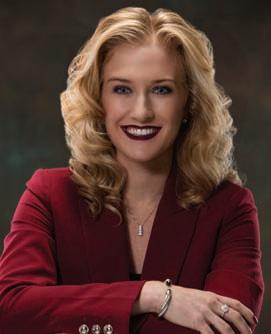


After graduating from the University of Nevada, Reno with a civil/environmental engineering degree, Melissa Aarskaug began her career in banking and civil engineering. As one of only three women in her engineering classes, Aarskaug relied on her open-mindedness and positive attitude to succeed. As finishing school, Aarskaug began mentoring young women and men, recruiting some into the College of Engineering.
Aarskaug subscribes to the notion that when and if the student is ready, a teacher will appear. The first of many mentors in her life, her father taught her about managing money, how to build a business, how to lead, and how to achieve her goals. Aarskaug now spends time with younger girls, mentoring self-confidence, goal-setting, and understanding finances. Actively involved in multiple volunteer organizations, Aarskaug has served on various boards, and is engaged with Global Gaming Women and Lean-In groups.
Aarskaug was working—and achieving success—in the civil engineering field when an opportunity presented itself to join the gaming industry with Gaming Laboratories International (GLI). After excelling at GLI, she transitioned to an executive role as vice president on the Bulletproof team. The gaming business presented unfamiliar challenges with intricacies and unique client needs.
With time and dedication, she was able to expand her knowledge and develop trusting relationships with colleagues, partners and clients. Applying her leadership skills and forward-thinking vision, Aarskaug assisted in successfully growing and leading Bulletproof services across the globe in the gaming industry. Additionally, she grew business lines in state governments, utilities, voting, construction, finance, and other verticals.
“All of us are effectively led by experience and habit, the people we surround ourselves with, what we have learned from our mistakes and successes, books we’ve read, and companies we’ve worked for,” she says. “We can always alter our direction. Do not let an adverse past affect your future.”
Aarskaug is a firm believer in always looking at change with a willingness to adapt whether to positive or negative experiences. She is eager to meet and overcome new challenges, and she has the foresight to recognize the next. A lifelong student, she hopes to continue to grow within her company and to lead by example. She constantly seeks to strengthen her relationships with her customers, and she excels at reaching out to new customers to help them identify and solve their business challenges.
Her advice to future emerging leaders is to flow with the seasons of life, follow your instincts, and do not be afraid to ask for guidance. Similarly, she advises to not be afraid to speak up with a new idea or if you disagree with the approach, methodology, application or implementation, because there is always room for improvement. She recommends communicating in real time with all parties concerned, pertinent to the challenge at hand, the result of which will only accelerate a positive outcome.
“Own your success and be proud of your accomplishments,” Aarskaug advocates. “Do not wait for someone to tell you ‘good work.’ Tell yourself ‘good job.’ Be humble and proud!” —Allison McCoy is vice president of business development for The Innovation Group.
Getting IT Marvin Phillips • Director, Information Technology, Akwesasne Mohawk Casino Resort
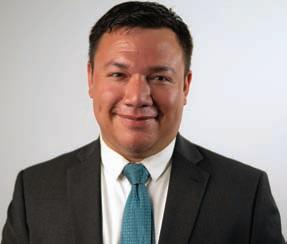
In sports, teams often enjoy a home field advantage. For Marvin Phillips, home field advantage meant growing up and then working in the same community.
Phillips has worked for the Akwesasne tribe’s Mohawk Casino Resort his entire career, leading to his current position as director of information technology.
“When we refer to tribes, we’re talking about our families,” says Phillips, a tribal member.
Working for the Mohawk property was not a hard sell. “Watching the Akwesasne Mohawk Casino Resort being built in my back yard more than 20 years ago, it was an easy decision for me at an exciting time throughout Indian Country.”
Still, working in gaming was not something he initially felt was a calling. The State University of New York College of Agriculture and Technology at Morrisville, where he received a bachelor’s degree, offered gaming and casino management courses as electives. He researched both commercial and tribal gaming, and because of the aid the casinos provide for their communities, went with the tribal courses.
At the time of his arrival at Mohawk, the IT department was in its infancy, Phillips says. It’s grown along with the resort. So have Phillips’ responsibilities.
“I am responsible for our organization’s IT infrastructure, and my team develops the overall technology strategy, including cybersecurity. Mitigating risk is my 24/7 job,” he says.
The Covid-19 pandemic crashed down on Mohawk like it has on casinos elsewhere in the country. “It’s much more than a casino floor, it’s our tribal general fund, our community organizations and social services, health care, education, public safety funding. This pandemic has forced us to lean out operations and increase our emphasis on cybersecurity and resiliency,” he says.
Almost everyone worked virtually, which required diligence from Phillips’ IT department.“That responsibility includes constant network maintenance, developing solutions to improve the service and keeping our members secure, online,” he says.
The single most difficult obstacle Phillips faced has been ageism. He was a director at 22. “That brought challenges with both my colleagues and the vendors I negotiated with. I learned to modify my approach, adapt, and create my own leadership style,” says Phillips, who relaxes by traveling and exploring, at times with members of his large extended family.
More than 20 years later, Phillips witnessed the maturation of IT, shifting from a reactive business unit to an integrated, long-term, strategic planning unit that adds decision-making to the entire organization.
Phillips cites two mentors that helped him along the way. Dwight Terrance was his first directorof IT. “Dwight drilled process, process and the importance of processes into me.”
Patrick Bassney was a former GM/CEO during a major property expansion. “Patrick taught me how paying attention to every little detail makes an enormous impact. These two men influenced my career immeasurably. They helped me understand that mentorship is a two-way street.”
And of course, Phillips credits his parents, Richard and Vicky, who instilled the strong work ethic and sense of contributing to the greater good, he says.
Phillips says continual learning is key for anyone interested in the IT end of the industry. That could mean online courses or conferences. “Keeping your skills fresh is imperative. Cybersecurity threats evolve rapidly, and we have to meet that challenge by protecting our guests and our investments.”
That said, the field is an exciting one for Phillips. “It’s why I’ve stayed for so long, and I’m still under 40. It’s how I hope to spend the rest of my career,” he says. —Bill Sokolic
Climbing to the Tree Top
Suzanne Duchene • Slot Service Manager, Seneca Niagara Falls Gaming
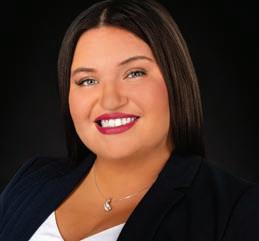
In all aspects of life, Suzanne Duchene exemplifies drive, tenacity, dedication and ambition. She is a proud member of the Seneca Nation Heron clan, a wife, and mother to three amazing boys. With true passion and excitement for gaming, Duchene has been involved in the industry for nearly 14 years. At the age of 18, she began her career as a part-time slot attendant. While working on the floor of Seneca Niagara Resort & Casino, Duchene noticed supervisors within leadership roles that she believed would exemplify her innate leadership traits and abilities. Devoted to progressing her career, Duchene began attending various training offered by Seneca Niagara and working with their career development department to refine and develop leadership skills. After three years of hard work and perseverance, Duchene took a leap into management at only 21 years old. She went from working side by side with the people in the slot department to leading them. Seneca cultural tradition helped her make that transition. Applying the “principles behind the Great White Pine tree—how the roots, the branches and the soil work together in order for the tree to thrive,” she committed to the leadership ideal that all team members, “from the entry-level workers to each rising level of management, have to be taken care of in order for us to succeed as a department and ultimately a business,” she says. By the age of 30, Duchene had distinguished herself among her peers as a high-performing junior leader in the organization, and accepted a promotion to slot service manager. This role has provided her the opportunity to make changes behind the scenes to better enhance and improve the experience and property for guests and team members. Duchene strives to continue to improve herself to make a positive difference within the workplace, and during these unprecedented times is looking forward to coming up with innovative ideas on how to successfully navigate through these obstacles, arising to reap the rewards. Duchene is ready to take on any task, and to assist wherever it is needed. She lives by the belief that “there is no task beneath you. You have to be willing to assist wherever and whenever it is possible for you to do so.” By taking on more responsibilities and continuing to grow to gain greater industry knowledge, Duchene aims to assist Seneca Gaming Corporation in attaining their collective goals as a company and team. When asked what being a part of 40 Under 40 means to her, Duchene states how it is truly a humbling honor. As an honoree, she hopes “to empower other young professionals to set and achieve their goals so that they recognize their importance in their workplace and realize it does not simply have to be a job, but that with hard work and determination, it can become a fulfilling career.” The best advice Duchene has to offer young professionals is to “always jump at the opportunity to learn and improve” and to remember that “you were chosen to be in your position for a reason. Others have faith in your abilities, so always keep in mind that you are a reflection of those who believed in you.” —Krista McPherson is an analyst with The Innovation Group.
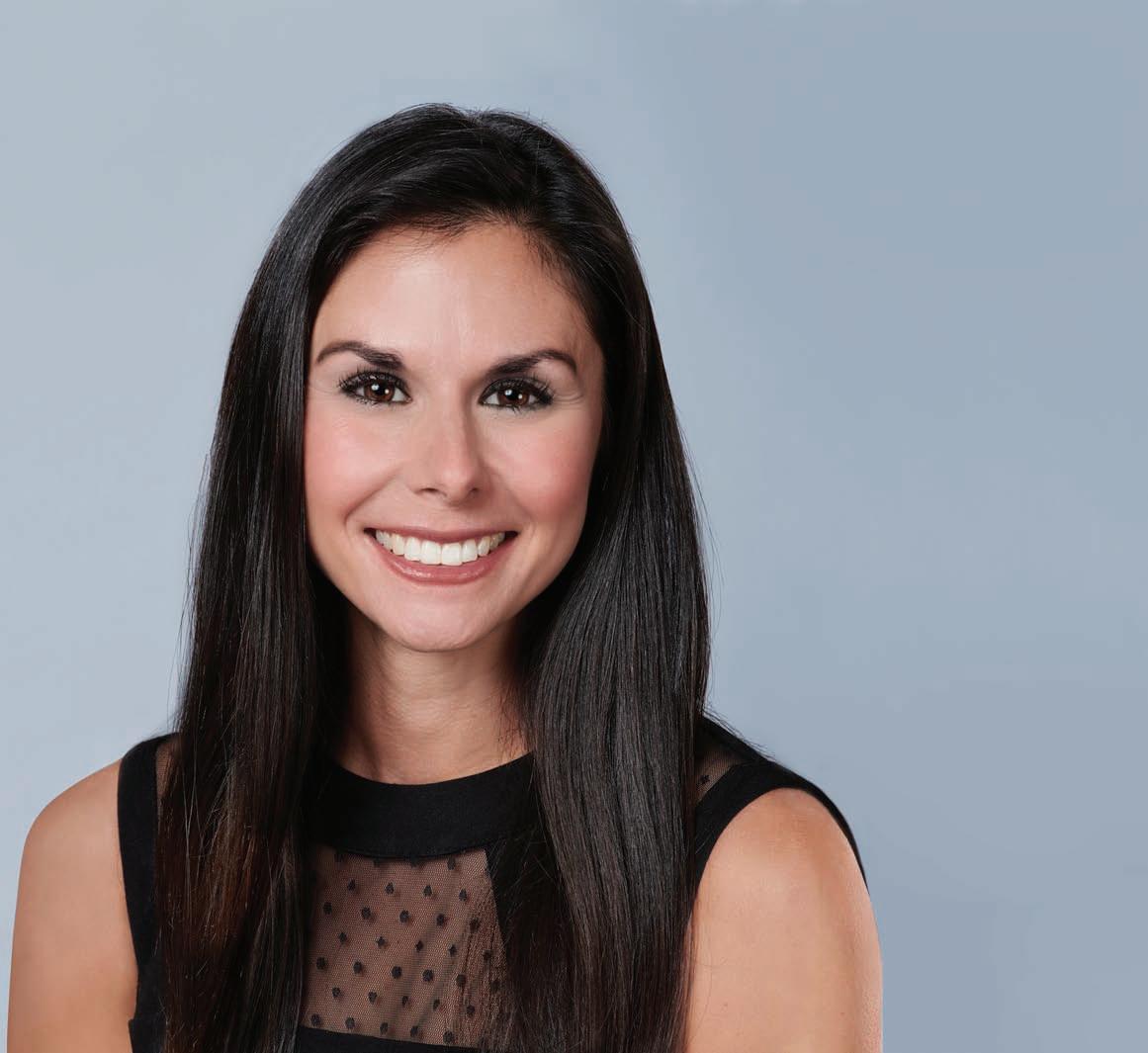
Trusting the Tribe Bryan Hayes • Senior Vice President, Gaming Operations, Foxwoods Resort Casino
Bryan Hayes got a promotion to senior vice president of gaming operations at Foxwoods Casino Resort in March. Heck of a time for promotions. “We almost immediately closed the property, of course, so I have been acclimating to the role since we reopened in June,” Hayes says. Except for his time at Nichols College in Massachusetts and three years in Las Vegas, Hayes spent his entire career at Foxwoods. The fact that he is a member of the Mashantucket Pequot Tribe which owns the casino added icing to the cake.
“But I didn’t always want to go into the gaming industry,” he admits. “In high school, I began to steer towards a career in the investment banking industry.”
But the idea of working for his community made a lot of sense, so Hayes pursued gaming.
“I was fortunate to be able to take advantage of our tribal member development program after graduating from college, participating in an internship rotation both here and with our former partners in Las Vegas.”
MGM Resorts selected him for the corporation’s Management Associate Program as a finance student, which is how he gave three years to MGM Grand and Luxor.
At Foxwoods, Hayes has worked in income audit, general ledger, financial analysis and slots, holding various positions. In his current job, he is responsible for strategy and direction of the gaming and analytics divisions, a broad brush of activities.
Since his appointment, Covid-19 and its impact have been a focal point. For the first time in its history, Foxwoods shut down for almost three months.
“Working through and reopening in the middle of this pandemic has been extremely challenging and educational at the same time,” says Hayes, who enjoys watching the Yankees, playing sports, and hiking with his wife, Kirsten, and his sons Alexander, 13, and Landon, 6.
“We had to make decisions to only reopen portions of the property. Every day has been a learning experience and we still continue to learn how to operate, compete, protect our team and guests and most importantly, we have had to be flexible,” he says.
To state the obvious, 2020 has thrown the most obstacles in Hayes’ career path. But before Covid-19, Hayes leaned on certain people for guidance.
“Our current chairman, Rodney Butler, was one of my first mentors,” says Hayes, “and he continues to be a great source of leadership. He spent a lot of time with me when I first joined Foxwoods discussing the business and sharing his expertise.”
A former boss—and current peer—Karen Lanigan, senior vice president of finance at Foxwoods, taught Hayes about due diligence and working collaboratively. The late Felix Rappaport became one of the most influential people in his life.
“I worked under him in Las Vegas for two years, and then again when he took the helm of Foxwoods as CEO in 2014,” Hayes says. “He was just a tremendous human being and taught me so much about the importance of being positive, and investing in building lasting relationships.”
Rappaport also imparted this simple lesson: treat everyone the same.
“I work tirelessly to embody that. He always supported my growth and pushed me to embrace new roles. His confidence in me and my ability to lead has had a big impact on my entire career,” Hayes says.
Hayes learned from the industry giants before him. He’d like to help those coming into gaming behind him. “Be as collaborative as possible and build as many relationships as you can. I have been very fortunate in my career to have many great mentors, and they all were extremely skilled at collaborating with others, and creating strong teams. Also, take time to reflect; life moves quickly, and be sure to make time.” —Bill Sokolic
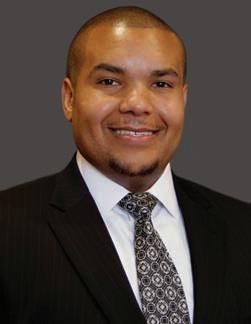
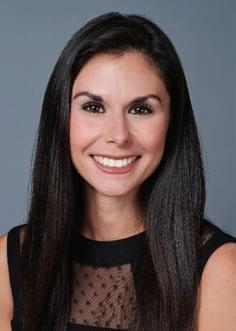
One of the main reasons slot manufacturer International Game Technology came to dominate the supply sector in the 1990s was its introduction of the licensed brand. Beginning with the introduction of Wheel of Fortune in 1996, IGT made recurring revenue from licensed brands a fixture of the industry.
But that singular idea does not begin to tell the story of the executive now in charge of that vital function at IGT, Jennifer Fales. Fales, who is currently IGT’s vice president of global brand licensing, has succeeded not through a singular idea, but through a diversity of experience covering nearly every aspect of the casino industry—both the operational and supply sides.
A Louisiana native, Fales had no inkling of a career in gaming while studying finance and management at Tulane University in New Orleans. A slow economy in the early 2000s would change that.
“I was dead set on being an investment banker,” she recalls.
But the gaming industry came calling in the form of a recruitment effort at Tulane by Harrah’s New Orleans.
“I believe half my class interviewed for the job; there was one position,” says Fales. “I got the job offer, and I remember telling my mother, ‘I don’t think I want to work for a casino.’ I’d never even thought of working for a casino. Then, I remember thinking, ‘Try it; you might love it.’ And that’s exactly what happened.”
It was fortuitous that the operator was the company then called Harrah’s Entertainment, which put a lot of emphasis on planning and analysis. After nearly two years as a property-level
financial analyst, Fales’ career was off and running, and her experience eventually covered every aspect of casino operations, from digital marketing at the corporate level to media performance. She was senior financial analyst for the corporation when Harrah’s acquired Caesars in 2005.
“During those years, I learned the way a property works, inside and out,” Fales says. “I got to learn about the dynamics of various properties in an enterprise that was so large. At Caesars and Harrah’s before it, planning and analysis was a springboard department. You learned the business, and then you could go into any aspect of the business you liked. It opened up a lot of doors.”
One of those doors opened to the supply side of the business, when in 2008, IGT brought Fales on as chief of staff to the chief operating officer. In that role, she honed her expertise in every aspect of IGT’s day-to-day operations.
Fales’ diverse experience led to a rapid rise at IGT. For five years, she progressed through roles in global marketing and product management, ultimately leading to her current role directing one of the company’s most vital areas.
These days, she oversees brand licensing for all segments of the company’s business globally, from casino slots to digital gaming to the company’s venerable lottery division.
“The responsibility spans from the beginning of the process, where we acquire brands,” Fales explains. “We do research, through to contracts, launching the game, and working with product management and the studios, through to working with the marketing team when we launch.” The scrutiny, she says, extends through the entire life cycle of each brand.
While Fales is always on the hunt for new brand partnerships, she says maintaining the current partnerships is among her most important functions. For instance, next year, the company plans to stage a series of events honoring the 25-year anniversary of Wheel of Fortune, the star in the company’s partnership with Sony. Other important partnerships include Fremantle Media (American Idol) and Warner Bros. (The Hangover).
“We’re always searching for new branding opportunities, but a lot of our new opportunities come from our existing partners,” says Fales. “So, (my job is) really about continuing to maintain those good partnerships with our existing partners, because they continually have new properties that they bring to the table.”
Fales’ career path is a testament to building a diverse background, which is her primary advice to young executives entering the industry.
“Expose yourself to as many different segments of the business as possible, whether you’re on the operator side or the manufacturing side of the business,” she says in advice to those entering the industry. “I’ve had a lot of success with a diverse background.”
Clearly, that success will continue for a long time. —Frank Legato
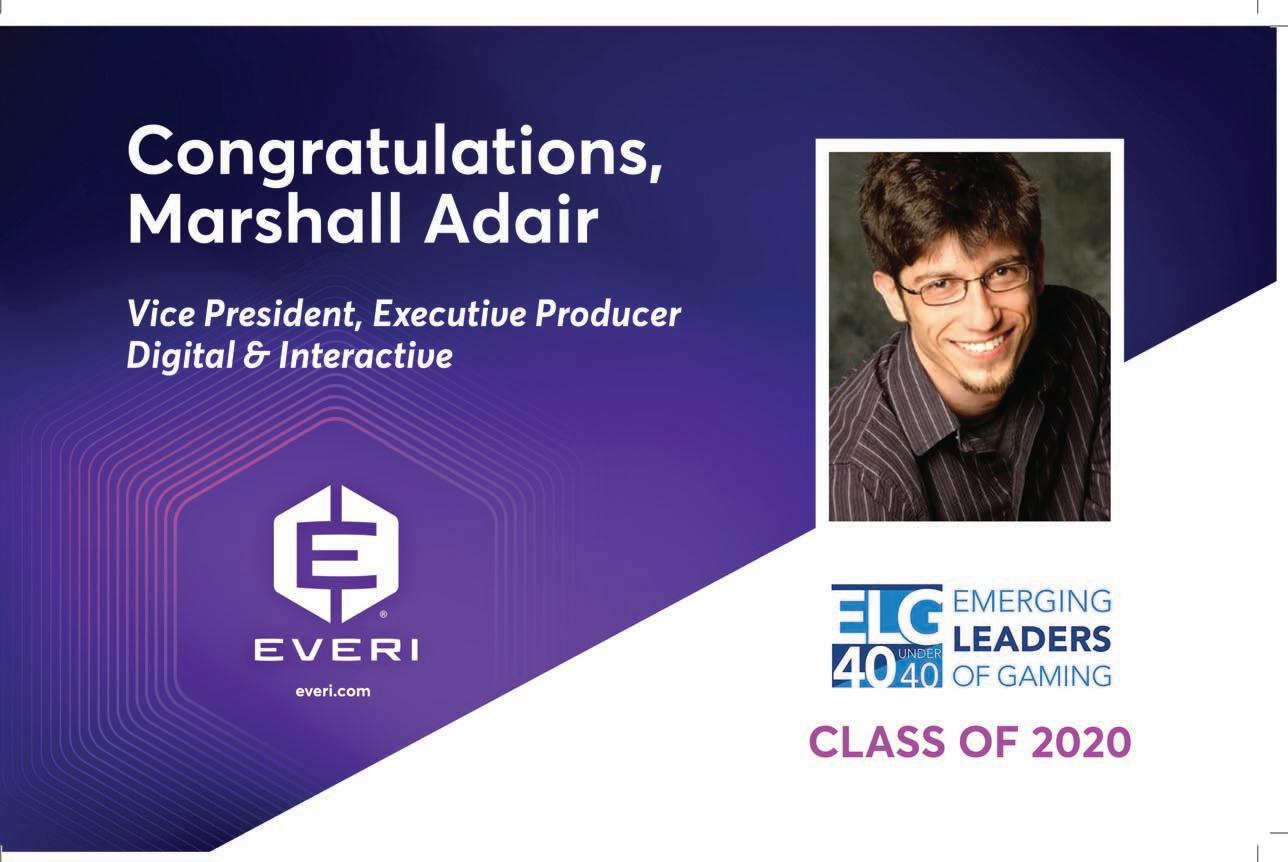
Listening Leads to Big Ideas JaNessa Bumgarner • Chief Executive Officer, Lucky Eagle Casino & Hotel
In July 2020, JaNessa Bumgarner took on a new role and a new challenge: chief executive officer of Lucky Eagle Casino & Hotel. In doing so, Bumgarner became the first Chehalis tribal member to serve as CEO in the casino’s 25 years. Her ascent up the corporate ladder started in 1999 when she walked through the doors of Lucky Eagle to start as a busser, not knowing what the future had in store.
Bumgarner acknowledges that there are many people who have helped get her to where she is today.
Sean Vestal, Bumgarner’s former boss and first mentor, was a champion for her during the early years of her career. Vestal would constantly gush about his experience at college, and over time, he inspired Bumgarner to get a college education, which resulted in her landing in the Hospitality Management program at the University of Nevada, Las Vegas.
Bumgarner says about her experience, “My decision to return to college and complete my degree at UNLV was definitely the most impactful decision of my career. It fueled a number of career opportunities and provided a foundation to build from.” As a student, she realized it is best to understand where you lack experience and to not hesitate to reach out for help.
After internships with Marriott and Great Wolf Lodge, Bumgarner returned to Lucky Eagle in 2014 as the director of hotel operations, and three years later faced what she cites as the greatest challenge of her career: becoming chief operating officer. Initially unsure if she wanted the position, she ended up applying at the last minute. After all, her passion was in hotel operations and hospitality, not slot and table utilization. Bumgarner was offered the role and subsequently had to adapt to the new challenge. She learned how to succeed, not by pretending she had all the answers, but by relying on and learning from those who worked for and around her.
“Throughout a career, we will be faced with new challenges and issues,” Bumgarner says. “Being honest about our initial limitations is simply an honest approach to dealing with any challenge or situation. I think my team appreciated this, and it gave me some great opportunities to learn and acquire new skills.”
Now as CEO of Lucky Eagle, Bumgarner has taken the initiative to help her team members work collaboratively and share ideas, much as she has throughout her career. A step in that direction has been the creation of the “Big Idea Room.” Tons of thought went into transforming an empty office into an area “for brainstorming, creative thinking, and problem solving—where people can share ideas about making our organization better.
“This is a space in which I hope emerging leaders feel safe, allowing them to thrive,” Bumgarner says. Everything from the color of the room to the scent and lighting—which she describes as “perfect”—was done intentionally to promote productive brainstorming. Although she has only been CEO for a few months, the implementation of the Big Idea Room is one of Bumgarner’s proudest changes to date.
Bumgarner’s advice to aspiring young leaders is, “There is far more to be gained from listening than from speaking. Learn to listen. It is a skill and it is something you can do better.” —Alex Goldstein is an analyst for The Innovation Group. Home Sweet Home André Barnabei • Vice President of Gaming, Rivers Casino Pittsburgh
Turns out Thomas Wolfe was wrong. You can go home again, or at least close to home.
André Barnabei was working in Harrah’s Philadelphia casino when a headhunter contacted him about an opening with Rivers Casino Pittsburgh.
“I grew up about 30 miles from Pittsburgh, so I welcomed the opportunity to return close to home and be closer to my family,” he says.
The job involved human resources, his major at Washington and Jefferson College. Barnabei spent more than eight years in human resources at Rivers Casino then moved to the gaming side when another position came along.
“I had discussions with our general manager and let him know I was interested in other opportunities where I could add value,” he says.
The GM asked Barnabei to become vice president of slots, and his career on the gaming side matured into his current role as vice president of gaming. He oversees slots, tables, BetRivers Sportsbook and poker operations.
“I am a leader on the executive team where we look for continuous improvement across all lines of our operation,” Barnabei says.
The team did not expect the coronavirus pandemic. “Covid-19 has challenged all of us to look at the way we run our business through different lenses. Our first mission was to ensure we had proper plans in place to make sure our team members and guests were able to enjoy a clean and safe environment,” he says.
The executives determined how to run the casino in the most efficient and effective ways when reopening, knowing guest levels would not be close to preCovid days.
“Personally, it continues to motivate me to find new and innovative ways to advance our business,” Barnabei says.
Rivers Casino is feeling a sense of normalcy with familiar faces returning to the property. Especially important at this stage of recovery is guest support for how clean the place seems and how safe patrons feel, he says.
Covid-19 is not the only obstacle Barnabei has had to overcome. On a flight returning to Pittsburgh from G2E, the GM leaned across the aisle and said the CEO wants to open a retail sportsbook by December, less than 50 days.
“He said I would be responsible for getting it off the ground. He smiled and said ‘I think it is an aggressive timeline, but you will figure it out.’ For the remainder of that flight, I worked to develop an opening timeline that led us to debuting the first retail sportsbook in Pennsylvania.”
Barnabei credits his family with the largest impact on who he is today. “I find myself repeating some one-liners passed on to me from my parents and grandparents such as ‘When you walk in to a room, you’d better greet every person and say goodbye when you leave.’ When you think about it, it is really that simple!”
Relaxing is not in Barnabei’s DNA, he says. In addition to his hours with Rivers Casino, he owns a property rental company. But he finds ways to wind down. Doing projects around the house, for example. And with his wife, Jessica, getting involved with their children.
“I coach T-ball and youth football.”
Barnabei suggests prospective staffers in the industry jump in with both feet. “It doesn’t matter where you start, it just matters that you maintain a positive attitude. The greatest thing about this business is the opportunity to advance your career. Where else could you move from one department to another and stay working for the same company?” — Bill Sokolic
Determination Over Difficulty Mary Parker • Management and Program Analyst, National Indian Gaming Commission
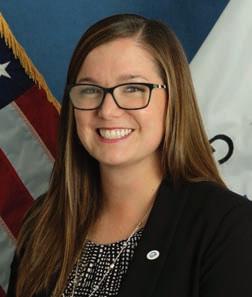
As a little girl, Mary Parker dreamed of becoming a kindergarten teacher at the local elementary school. Her small Oklahoma town was all that she knew, and the world past its borders seemed like something vague and intangible. Little did she know, however, that as an adult, she would embark upon a career adventure that would carry her to the far reaches of the nation, empowering her to make professional achievements she had never imagined.
Just eight short years ago, Parker found herself raising her children during a pivotal point of her life, a stay-at-home mom who knew she needed a plan of action, and fast. She drafted up a list of “crazy goals,” as she called them. And one by one, she checked items off the list, items like getting a job, buying a house, and obtaining a master’s degree in administrative leadership from the University of Oklahoma. Thinking that desperate times called for desperate measures, she accepted the first job she was offered, as an administrative assistant for Will Rogers Downs Racino. But the position turned out not to be desperate at all.
Within a year, she was promoted to talent development specialist. A year after that, she was promoted yet again to compliance trainer. In the blink of an eye, Parker surveyed her surroundings to realize that not only did she have a career in the making, but she was able to give back to her people while doing something she loved, a benefit she knew that many people are not afforded.
After seven years of serving her tribe of Cherokee Nation, Parker was offered an enticing opportunity with the National Indian Gaming Commission (NIGC). She knew the position would pose its own set of challenges in forcing her to juggle the demands of career and parenthood, but she was not about to let the difficulty level dissuade her from pursuing her dreams.
With her drive to achieve outweighing her fear of failing, she took a leap of faith and accepted the position. As expected, her new arrangement called for a substantial amount of travel, but it was also a scenario she had dreamed of all her life, taking her on regular trips to Washington, D.C. and other locations throughout the U.S.
Parker’s new role offered her the chance to represent not only her own tribe, but all tribes across the nation. Her conflict in wanting to excel at parenting and at the job she deeply loved inspired the creation of a personal motto that she has lived by ever since: you can do anything hard for a little while. Proud to work for the NIGC and the mission it stood for, Parker recognized that this was more than just a job. It was a chance to do what she loved, to act as a role model for small-town girls like she herself had once been, and to make a real difference.
Known for her rock-solid work ethic, Parker’s passion for understanding effective leadership lends itself to forging relationships destined for success. She is now pursuing her doctorate degree in instructional systems design and technology at Sam Houston State University, and she continues to thrive in both her role as a career woman and as a parent, even finding time to undergo community volunteer work.
Advises Parker to future emerging leaders, “Don’t do something just for advancement. Find something that you are passionate about, look for ways to grow while pursuing your dreams, and be sure to share with and teach your peers along the way.” —Marie Casias is manager of marketing and administration for The Innovation Group.
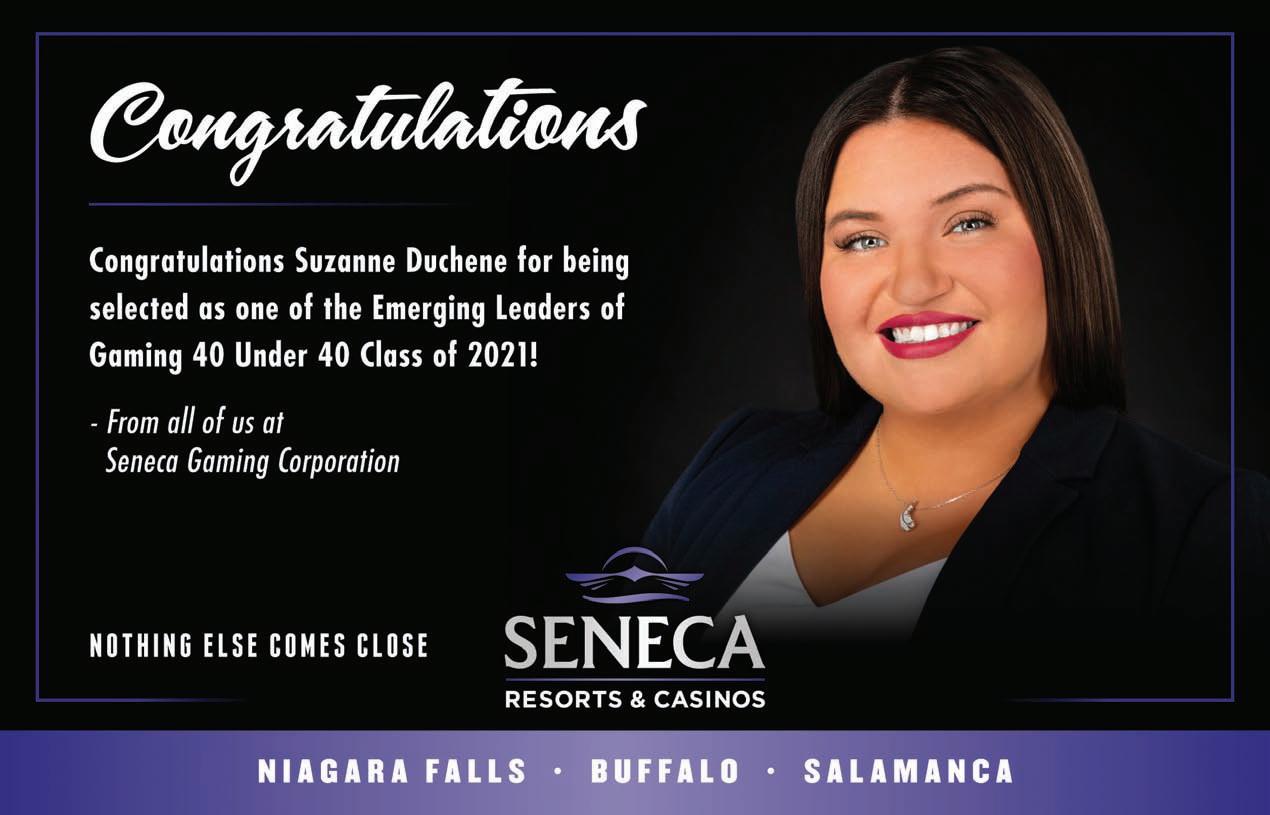
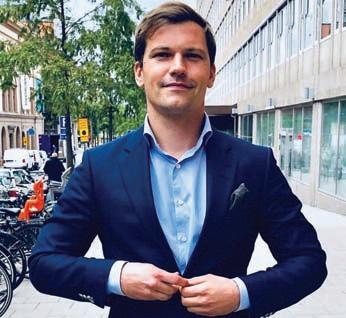
Responsible Approach
Martin Lycka • Director of Regulatory Affairs, Trustee of the GVC Foundation U.S., GVC Holdings PLC
When Martin Lycka cites his parents as one of his influences, there is one aspect he thinks may have disappointed them.
“My parents were both professors of chemistry when my sister and I were growing up, so it was expected that we’d follow them to university,” he explains. “But when I chose a legal career, I don’t think that’s what they were expecting.”
It has worked out for Lycka. After graduating from the Prague Law Faculty, he got an internship at the Dentons, one of the leading law firms in the Czech Republic. Since the country had recently passed a law that legalized gaming, he immediately started studying gaming regulation, and after earning his law degree at the College of Europe in Bruges, he was offered a job at an early incarnation of Betfair, now part of Flutter Entertainment.
Lycka says the expectation early on was that gaming laws would become “harmonized” within the European Union.
“If that had happened I might be out of a job,” he laughs. “Ever since then counselors were important. At Betfair, I would work with officials of the Isle of Man, Denmark, Spain and other countries, progressively moving myself up the ladder.”
Just as sports betting and online gaming started to proliferate in the U.S., GVC offered him a job, much better than the offer he had at Betfair.
He says his experience in the European regulatory environment prepared him for the U.S.
“It’s just another version what happened in Europe,” he says.
Lycka says he actually prefers the state-by-state approach to regulation.
“It’s better for the global operators,” he says, “even though there is a strong tendency to at least partially reinvent the wheel.”
He’s hoping that the U.S. can avoid the backlash from elected officials that many European countries have seen as a result of a lack of focus on consumer protection and responsible gaming. As such, he’s helped GVC craft a proactive approach in the U.S. toward those factors through collaborations with such institutions as Harvard’s Division on Addictions, Seton Hall University, the University of Nevada, Las Vegas and others.
“First of all,” he says, “it’s the right thing to do. If the U.S. industry is much quicker off the mark, we don’t have to go through the purgatory of what occurred in the U.K., Italy and other countries. This was sadly self-inflicted by the industry, and now we’re paying the price for the sins of the past. How long will it take to reconcile?”
Ironically, Lycka doesn’t see a harmonization of responsible gaming responses by gaming operators as superior to going it alone. He says the general parameters of responsible gaming are agreed upon, but each company has a unique approach, which should not be discouraged.
“Every single operator has introduced triggers into the system to detect possible problem gambling,” he says. “So the implementation should be left to individual operators.”
Lycka says he learned from partners in his early law firms, but cites in particular his first boss at Betfair, Fiona Dormandy.
“She’s now the general counsel for Airbnb in the EMEA, and she taught me an immense amount about regulations,” he says.
He also says his current boss is somewhat underappreciated.
“Robert Hoskin likes to keep a low profile, but I’ve learned a lot from him about strategic issues. He’s a pragmatic, no-nonsense guy.”
Lycka believes it is a great time for young people to get involved in the gaming industry.
“Internet gaming and sports betting are still novelties,” he says. “There are massive opportunities in these areas. Yes, it will take hard work and there’s a steep learning curve, but if you get in, it can be a very rewarding career because you get exposed to all parts of the industry—lawyers, regulators, suppliers, operators.”
To cut down that learning curve, Lycka also has suggestions.
“Listen to the more senior members of the team. Learn from your mistakes. Think outside of the box. There really are no shortcuts,” he says. —Roger Gros
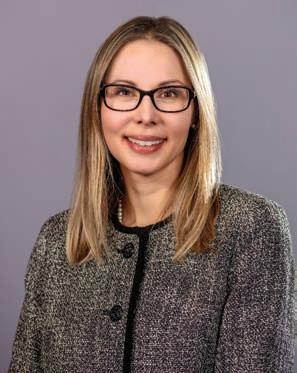
Invaluable Connections Connie James • Chief Financial Officer, Gaming, Scientific Games Corporation
In January, Connie James was named chief financial officer of the gaming division at Scientific Games. For James, heading finance at one of SG’s three main divisions represents the completion of a full circle in a career that flourished during nine years working at one of the supplier’s chief rivals, Australia’s Aristocrat Leisure Limited.
James, like many executives in the gaming industry, did not start her professional career with gaming in mind. When the Southern California native was in her senior year of high school, her family moved to Las Vegas. After graduation, she earned an accounting degree from the University of Nevada, Las Vegas.
At UNLV, James took an introductory course in gaming conducted by an adjunct professor who was vice president of internal auditing for MGM Resorts. She was invited to intern in MGM’s audit department, which led to her hiring as a senior analyst in the risk services practice at Las Vegas-based Deloitte & Touche LLP in 2004.
“Being centered in Las Vegas, clearly Deloitte had a portfolio centered in the gaming industry,” James says. “So, those companies became my clients.”
After Deloitte moved James to its Sydney, Australia office in 2007, James worked more closely with Aristocrat, one of the firm’s major clients. “(Aristocrat) knocked on my door enough times that I finally joined them,” she says.
Hired as Aristocrat’s head of global risk & audit in 2009, James was to rise through the finance ranks at Aristocrat through nine years—as VP of finance, product and technology in Australia, back to Las Vegas in 2013 as CFO for the Americas and
business operations, and finally, as CFO of global land-based gaming before leaving in 2018 for a position in global finance for Cargill in Minneapolis-St. Paul, the hometown of her husband.
“Cargill is just a phenomenal company,” she says. “I had made this deliberate decision to move to Minnesota and be closer to my husband’s family, and I quickly became ingrained with that business, and had this vision that for the next 20 years, I’d be part of the Cargill family.”
However, history would repeat itself to intervene in her life. Jamie Odell, who had become CEO and managing director of Aristocrat shortly after James arrived, became an adviser to Scientific Games CEO Barry Cottle in 2019, shortly after James went to Cargill. This year, Odell took over as executive chairman of Scientific Games, and Toni Korsanis, the former CFO of Aristocrat under Odell, was named vice chair.
Those two executives are part of a management transformation at Scientific Games that has seen several former top Aristocrat executives brought on, including Matt Wilson, now SG’s CEO of gaming. Last year, Odell called on James to complete the new executive team as CFO of the gaming division.
“It’s exciting,” James says of her new role at SG. “I worked directly for Toni Korsanis for nine years in a number of different roles. I think Jamie and Toni are industry legends, and their ability to look at organizations, understand the strategic elements, the operational execution, and most importantly, focus on people and culture, is a winning combination.”
James now works with Wilson in SG’s relatively decentralized organizational structure. She says their focus is defining the strategic direction of the division, and on enabling current processes and operational excellence to assure the execution of that strategy. “The key focus needs to be pairing our investments to the products the players and our customers are most excited about, first and foremost,” she says.
“While we have become a more efficient organization, we’re laser-focused on executing a three- to five-year plan that we’ve just articulated. And now, with this amazing leadership team that has been assembled, we are positioned for a great future.”
In the end, most important is creating what James calls the “secret sauce” of a high-performance culture—“leading through values and driving the excellence in a team spirit, and making sure we’re all playing at our best to deliver on the strategic plan.
“I’m super excited, and super optimistic about the future.” —Frank Legato
